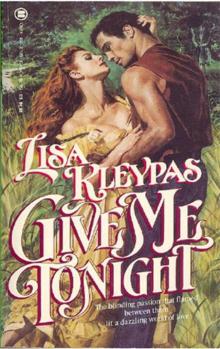- Home
- Lisa Kleypas
Smooth Talking Stranger Page 2
Smooth Talking Stranger Read online
Page 2
My little sister curled into a ball against me, trembling. She put her hands over her ears. “Don’t let him in, Ella,” she whispered. “Please.”
I was scared, too. But I pulled the covers around Tara and got out of bed. “She’s sleeping,” I said, loud enough for the monster at the door to hear.
“Open it, you little bitch!” The hinges rattled as he pushed harder. Where was my mother? Why wasn’t she doing anything?
In the feeble glow of a Rainbow Brite night-light, I frantically rummaged beneath the bed for the craft box where we kept our art supplies. My fingers curved around the cold handles of a pair of metal scissors. We used them to cut out paper dolls, pictures from magazines, and cereal box tops.
I heard the thud of impact as Roger put his shoulder to the door, so hard that the chair began to crack. Between each thud, I heard the sound of my sister weeping. Adrenaline raced through me, sending my heartbeat into a drumming fury. Panting, I went to the door, gripping the scissors. Another thud, another, with sounds of wood vibrating and splintering. Light from the hallway shot into the room as Roger shoved the door wide enough to get his hand in. But as he began to push the chair aside, I darted forward and stabbed his hand with the pair of scissors. I felt the sickening give of metal penetrating something pliant. There was a muted roar of pain and fury, and then . . . nothing . . . except the sound of retreating footsteps.
Still gripping the scissors, I got back into bed with Tara. “I’m scared,” my little sister had wept, soaking the shoulder of my nightgown with her tears. “Don’t let him get me, Ella.”
“He won’t,” I had said, stiff and shaking. “If he comes back, I’ll stick him like a pig. You go to sleep, now.”
And she had slept huddled against me all night, while I stayed awake, my heart jolting every time I heard a noise.
In the morning, Roger had left our house for good.
Mom never asked either of us about that night, or what had happened, or how we felt about Roger’s abrupt departure from our lives. The only thing she ever said about it was, “You will never get a new daddy. You don’t deserve one.”
There had been other men after that, some of them bad, but never quite as bad as Roger.
And the strangest part of all was that Tara didn’t remember Roger, or the night I had stabbed his hand with the scissors. She was bewildered when I told her about it a few years later. “Are you sure?” she had asked with a puzzled frown. “Maybe you dreamed it.”
“I had to wash the scissors the next morning,” I told her. It frightened me that she looked so blank. “There was blood on them. And the chair was cracked in two places. You don’t remember?”
Tara had shaken her head, mystified.
After that experience, after the parade of men who never stayed, I was leery and gun-shy, afraid to trust any man. But as Tara had gotten older, she had gone the other way. For her there were innumerable partners, and prolific sex. And I wondered how much real pleasure, if any, she had gotten out of it.
The urge to protect and care for Tara had never left me. During our teen years, I had driven to strange places in the night to pick her up where a boyfriend had stranded her . . . I had given her my waitressing money to buy a prom dress . . . I had taken her to the doctor to get birth control pills. She had been fifteen at the time.
“Mom says I’m a slut,” Tara whispered to me in the doctor’s waiting room. “She’s mad because I’m not a virgin anymore.”
“It’s your body,” I had whispered back, holding her icy hand in mine. “You can do what you want with it. But don’t get pregnant. And . . . I think you shouldn’t let a boy do that to you unless you’re sure he loves you.”
“They always say they love me,” Tara had told me with a bitter smile. “How do you know when one of them actually means it?”
I shook my head helplessly.
“Are you still a virgin, Ella?” Tara had asked after a moment.
“Uh-huh.”
“Is that why Bryan broke up with you last week? ’Cause you wouldn’t do it with him?”
I shook my head. “I broke up with him.” Glancing into her soft blue eyes, I tried for a rueful smile, but it felt more like a grimace. “I came home from school and found him with Mom.”
“What were they doing?”
I hesitated for a long moment before replying. “Drinking together,” was all I said. I thought I’d cried until no more tears were left, but my eyes watered again as I nodded. And although Tara was younger than me, she put her hand on my head and pulled it down to her narrow shoulder, offering comfort. We had sat together like that until the nurse came and called Tara’s name.
I didn’t think I would have survived my childhood without my sister, or she without me. We were each other’s only link to the past . . . that was the strength of our bond, and also our weakness.
TO BE FAIR TO HOUSTON, I WOULD HAVE LIKED IT A LOT more if I hadn’t been viewing it through a prism of memories. Houston was flat, humid as a wet sock, and surprisingly green in parts, dangling at the end of a belt of heavy forestland that extended from East Texas. There was a furious amount of development in every crevice of its spider-web layout—condos and apartments, retail and office buildings. It was an intensely alive city, flashy and spectacular and filthy and busy.
Gradually the summer-braised pastures turned into oceans of smoking-hot asphalt with islands of strip malls and big-box stores. Here and there a lone high-rise shot up like a plant runner sent out from the main growth of central Houston.
Mom lived in the southwest region, in a middle-class neighborhood built around a town square that had once harbored restaurants and shops. Now the square had been taken up by a large home-improvement store. My mother’s house was a two-bedroom colonial ranch style fronted with skinny white columns. I drove along the street, dreading the moment I would pull up in the drive.
Stopping in front of the garage, I hopped out of my Prius and hurried to the front door. Before I even had a chance to ring the doorbell, Mom had opened the door. She was talking to someone on the phone, her voice low and seductive.
“. . . promise I’ll make it up to you,” she cooed. “Next time.” She laughed at little. “Oh, I think you know how . . .” I closed the door and waited uncertainly while she continued to talk.
Mom looked the same as always: slim, fit, and dressed like a teen pop star, no matter that she was pushing fifty. She wore a tight black tank top, a denim miniskirt cinched with a rhinestone-encrusted Kippy belt, and high-heeled sandals. Her forehead was as taut as the skin on a grape. Her hair had been bleached Hilton blonde, falling to her shoulders in meticulously sprayed waves. As she glanced over me, I knew exactly what she thought of my plain white cotton camp shirt, a practical garment that buttoned down the front.
While listening to the person on the other end of the line, Mom gestured toward the hallway that led to the bedrooms. I nodded and went in search of the baby. The house smelled like air-conditioning and old carpets and tropical air freshener, the rooms dark and silent.
A small dressing-table lamp had been left on in the master bedroom. My breath quickened in anxious wonder as I approached the bed. The baby was in the center of it, a lump no larger than a loaf of bread. A boy. He was dressed in blue, his arms out-flung, his mouth clamped tight as a powder compact as he slept. I crawled onto the bed beside him, staring at this defenseless creature with his little-old-man face and tender pink skin. His eyelids were so fragile they were tinted blue as they lay closed over his sleeping eyes. The small skull was covered with soft black hair, and his fingers were tipped with nails as tiny and sharp as bird claws.
The baby’s absolute helplessness made me intensely anxious. When he woke up, he was going to cry. And leak. He was going to need things, mysterious things that I knew nothing about and had no desire to learn.
I could almost sympathize with Tara for having foisted this overwhelming problem on someone else. Almost. But mainly I wanted to kill her. Because my sister had
known that leaving him with Mom was a stupid idea. She had known that Mom would never keep him. And she had been aware that I would probably be recruited to do something about it. I had always been the family’s problem-solver, until I had opted out in an act of self-preservation. They still hadn’t forgiven me for that.
Since then I had often wondered how and when I might be able to reunite with my mother and sister, if we all would have changed enough that we could have some kind of workable relationship. I hoped maybe it would turn out like one of those Hallmark movies, a lot of soft-focus hugging and laughing as we sat on a porch swing.
That would have been nice. But it wasn’t my family.
As the baby slept, I listened to his soft kitten-breaths. His smallness, his aloneness, caused an invisible weight to settle over me, sadness mixed with anger. I wasn’t going to let Tara run from this, I vowed grimly. I was going to find her, and for once she would have to deal with the consequences of her actions. Failing that, I was going to find the baby’s father and insist that he bear some responsibility.
“Don’t wake him up,” my mother said from the doorway. “It took me two hours to put him down.”
“Hi, Mom,” I said. “You look great.”
“I’ve been working with a personal trainer. He can hardly keep his hands off me. You’ve put on weight, Ella. You’d better be careful . . . you get your figure from your daddy’s side, and his people always ran to fat.”
“I exercise,” I countered, annoyed. I was not at all fat. I was curvy and strong, and I took yoga three times a week. “And I get no complaints from Dane,” I added defensively, before I could stop myself. Immediately I was tempted to smack myself in the head. “But it doesn’t matter what anyone thinks of my figure, as long as I’m happy with it.”
My mother ran a dismissive glance over me. “You’re still with him?”
“Yes. And I’d like to get back to him as soon as possible, which means we need to find Tara. Can you tell me again what happened when you saw her?”
“Come to the kitchen.”
Easing myself from the bed, I left the room and followed her.
“Tara showed up without calling first,” my mother explained as we reached the kitchen, “and said, ‘Here’s your grandbaby.’ Just like that. I let her in, and I poured some tea, and we sat down to talk. Tara said she’s been living with your cousin Liza, and working at a temp agency. She got pregnant by one of her boyfriends, and she says he’s not in a position to help. You know what that means. Either he doesn’t have two nickels to rub together, or he’s already married. I told Tara she should put the baby up for adoption, and she said she didn’t want to do that. So I said, ‘Your life will never be the same. Everything changes after you have a baby.’ And Tara said she was starting to figure that out. Then she mixed some formula for the baby and fed him while I went to the back room to take a nap. When I got up, Tara was gone and the baby was still here. You’ll have to get him out of here by tomorrow. My boyfriend can’t know about this.”
“Why not?”
“I don’t want him to think of me as a grandmother.”
“Other women your age have grandchildren,” I said in a matter-of-fact tone.
“I’m not my age, Ella. Everyone thinks I’m a lot younger.” She seemed offended by my expression. “You should be happy about that. To know what’s in your future.”
“I don’t think I’ll look like you in the future,” I said wryly. “I don’t even look like you now.”
“You might if you put some effort into it. Why is your hair so short? You don’t have the right face for that style.”
I lifted a hand to my chin-length bob, which was the only practical style for my straight, fine hair. “Can I see the note Tara left?”
Mom brought a manila folder to the kitchen table. “It’s in here along with the hospital papers.”
I opened the folder and found a piece of notebook paper on top. The sight of my sister’s handwriting, all loopy and uneven, was painfully familiar. The words had been dug deep by a ballpoint pen that had nearly perforated the paper with its desperate force.
Dear Mom,
I have to go somewhere and figure things out. I don’t know when I’ll be back. I hereby give you or my sister Ella the authority to take care of my baby and be his guardian until I’m ready to come get him.
Sincerely,
Tara Sue Varner
“Hereby,” I murmured with a wretched smile, leaning my forehead on my hand. My sister had probably thought a legal-sounding word would make it more official. “I think we’re supposed to get in touch with Child Protective Services and let them know what’s happened. Otherwise someone could claim the baby has been abandoned.”
Sorting through the contents of the folder, I found the birth certificate. No father listed. The baby was exactly a week old, and his name was Luke Varner. “Luke?” I asked. “Why did she name him that? Do we know anyone named Luke?”
Mom went to the refrigerator and pulled out a can of Diet Big Red. “Your cousin Porky—I think his real name is Luke. But Tara doesn’t know him.”
“I have a cousin Porky?”
“Second cousin, once removed. He’s one of Big Boy’s sons.”
One of the legions of extended family that we’d never had anything to do with. Too many explosive personalities and disorders to put in one room together—we were a living catalog of the DSM-IV, the doctor’s manual of mental disorders. Returning my attention to the certificate, I said, “She had him at Women’s Hospital. Do you know who was with her? Did she say anything about it?”
“Your cousin Liza was with her,” came my mother’s sour reply. “You’ll have to call her to get the details. She won’t tell me anything.”
“I will. I . . .” Dazedly I shook my head. “What’s going on with Tara? Did she seem depressed to you? Did she seem scared? Did she look sick?”
Mom poured the Big Red over ice, watching the pink foam rise to the rim of the glass. “She was heavy. And she looked tired. That was all I noticed.”
“Maybe this is some kind of postpartum problem. She may need antidepressants.”
Mom poured a shot of vodka into the Big Red. “Doesn’t matter what pills you give her. She’ll never want that baby.” After taking a swallow of the fizzy-bright liquid, she said, “She’s not cut out for having kids any more than I was.”
“Why did you have children, Mom?” I asked softly.
“It was what women did when they got married. And I did my best. I made sacrifices to give you the best childhood I could. And neither of you seems to remember any of it. It’s a shame, how ungrateful children are. Especially daughters.”
I couldn’t begin to reply. I had no way to describe how I had struggled to collect every good memory possible. How every moment of my mother’s affection—a hug, a bedtime story—had been a gift from heaven. But mostly how my childhood, and Tara’s, had seemed like a rug pulled out from under us. And how her complete lack of motherly instinct—even the basic urge to protect her offspring—had made it difficult for Tara and me to have relationships with people.
“I’m sorry, Mom,” I managed to say, my voice thick with regret. But I was fairly certain my mother didn’t understand what I was sorry for.
A high, mewling cry came from the bedroom. The sound chilled me. He needed something.
“Time for his formula,” my mother said, going to the refrigerator. “I’ll heat it up. Go get him, Ella.”
Another cry, this one sharper. It made my back teeth hurt like I’d just bitten into tin foil. I sped to the bedroom and saw a small form on the bed, wriggling like a baby seal. My heart went so fast that I couldn’t feel any spaces between the beats.
I leaned over, reaching tentatively, uncertain how to pick him up. I wasn’t good with children. I had never wanted to hold my friends’ babies—they had never appealed to me. I slid my hands beneath the small flopping body. And the head. I knew you were supposed to support the head and neck. Somehow I gather
ed him up against me, his weight somehow fragile and solid at the same time, and the crying paused, and the infant looked up at me in a squinty Clint-Eastwood sort of way, and the crying started again. He was so unprotected. Helpless. I had only one coherent thought as I went to the kitchen, and it was that no one in my family, including me, should be trusted with one of these.
I sat and clumsily readjusted Luke in my arms, and Mom brought a bottle to me. Cautiously I put the silicone nipple—which wasn’t shaped anything like a normal human one—against the tiny mouth. He latched on and went quiet, intent on feeding. I hadn’t realized I was holding my breath until I let it out with a sigh of relief.
“You can stay here tonight,” Mom said. “But you have to leave tomorrow and take him with you. I am much, much too busy to deal with this.”
I clenched my teeth to hold back a burst of protests—this wasn’t fair . . . none of it was my fault . . . I was busy, too . . . I had my own life to get back to. But what kept me silent, aside from the knowledge that my mother didn’t care, was the fact that the person who was really getting the raw deal was the one who couldn’t speak up for himself. Luke was a hot potato, doomed to be tossed back and forth until someone was forced to keep him.
And then it occurred to me: what if the father was a cokehead or a criminal? How many guys had Tara slept with, and was I going to have to track them all down and have them tested? What if some of them refused? Was I going to have to hire a lawyer?
Oh, this was going to be fun.
MOM SHOWED ME HOW TO BURP HIM AND TO CHANGE the diaper. Her competence surprised me, especially since she had never been a baby person, and it had undoubtedly been a long time since she had last done such a thing. I tried to picture her as a young mother, patiently attending to the never-ending tasks of caring for a baby. I couldn’t imagine she had enjoyed any of it. My mother, with only a baby for company, a needy, noisy, inarticulate creature . . . no, it was impossible to envision.

 Devil in Spring
Devil in Spring Sugar Daddy
Sugar Daddy Devil in Winter
Devil in Winter Dreaming of You
Dreaming of You Christmas Eve at Friday Harbor
Christmas Eve at Friday Harbor Love, Come to Me
Love, Come to Me Only With Your Love
Only With Your Love Suddenly You
Suddenly You Secrets of a Summer Night
Secrets of a Summer Night Cold-Hearted Rake
Cold-Hearted Rake Where's My Hero?
Where's My Hero? Gifts of Love
Gifts of Love Married by Morning
Married by Morning Then Came You
Then Came You Wish List
Wish List Where Dreams Begin
Where Dreams Begin A Historical Christmas Present
A Historical Christmas Present Somewhere I'll Find You
Somewhere I'll Find You Scandal in Spring
Scandal in Spring Someone to Watch Over Me
Someone to Watch Over Me Worth Any Price
Worth Any Price Prince of Dreams
Prince of Dreams It Happened One Autumn
It Happened One Autumn Love in the Afternoon
Love in the Afternoon Devil's Daughter
Devil's Daughter A Wallflower Christmas
A Wallflower Christmas Tempt Me at Twilight
Tempt Me at Twilight Brown-Eyed Girl
Brown-Eyed Girl Mine Till Midnight
Mine Till Midnight Again the Magic
Again the Magic Lady Sophia's Lover
Lady Sophia's Lover Because You're Mine
Because You're Mine Midnight Angel
Midnight Angel Smooth-Talking Stranger
Smooth-Talking Stranger Blue-Eyed Devil
Blue-Eyed Devil Hello Stranger
Hello Stranger Dream Lake
Dream Lake Devil's Daughter: The Ravenels Meet the Wallflowers
Devil's Daughter: The Ravenels Meet the Wallflowers A Christmas to Remember
A Christmas to Remember Smooth Talking Stranger
Smooth Talking Stranger Crystal Cove
Crystal Cove Marrying Winterborne
Marrying Winterborne Stranger in My Arms
Stranger in My Arms Devil in Disguise
Devil in Disguise Worth Any Price bsr-3
Worth Any Price bsr-3 Give Me Tonight
Give Me Tonight Rainshadow Road fh-2
Rainshadow Road fh-2 Seduce Me At Sunrise
Seduce Me At Sunrise I Will
I Will Someone to Watch Over Me bsr-1
Someone to Watch Over Me bsr-1 Lady Sophias Lover bsr-2
Lady Sophias Lover bsr-2 A Hathaway Wedding
A Hathaway Wedding A Hathaway Wedding (Hathaways Bk2.5)
A Hathaway Wedding (Hathaways Bk2.5) Worth Any Price - Bow Street 3
Worth Any Price - Bow Street 3 Christmas with Holly
Christmas with Holly